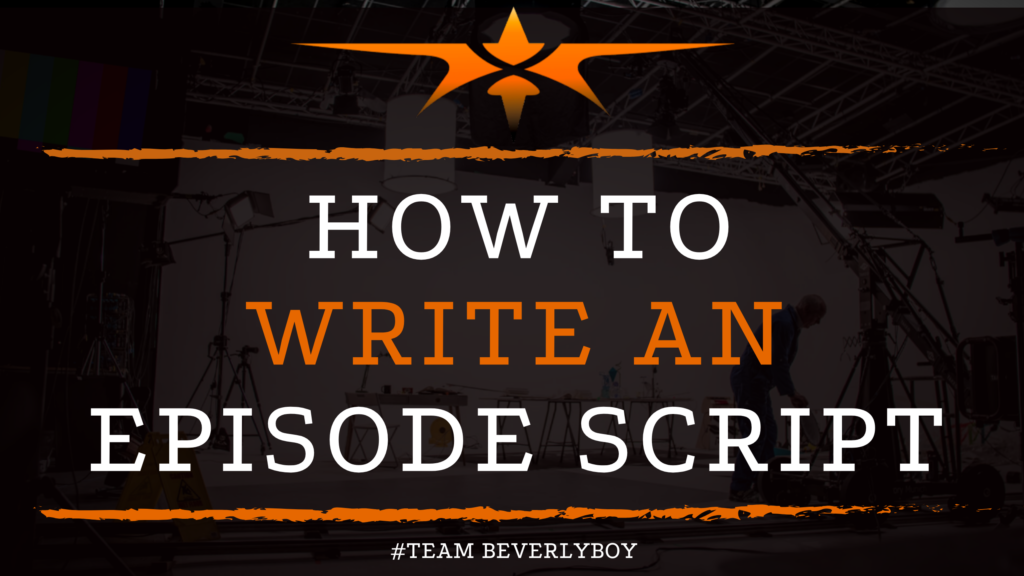How to Write an Episode Script
Writing a script for television is certainly a lot different than writing a script for a feature film or short film. There’s a lot less character building that takes place in a television episode script. And since the script is shorter, the narrative structure is often a lot different. Versus how it would be for a full feature film. Learning how to write an episode script for a television show or series represents an important task for any aspiring screenwriter to accomplish. These dialogue-driven scripts certainly do require the screenwriter to shift gears. Whether writing a single episode or an entire series of episodes.

When writing an episode, the idea is generally to format characters. Such that they will evolve and grow over a series of 10 to 24 episodes or more. Thus, the detail that is delivered in the first episode, or in each episode, is typically a balance.
Balance between focusing on the individual character arcs. That are going toward building the characters over time for the progression of the overall story. While also building the episodic beginning, middle and end for the particular 30 minute or one hour show.
Overall Story
Since television episodes generally have an overall story to them. In which there’s the main story focus. Which will be delivered over a period of several episodes. As well as the secondary story focus in which each episode delivers a sort of sub story.
The writing can be complex and incredibly dialogue-driven. Each half-hour drama or episode acts as both an individual story. As well as a part of another story.
Thus, each episode may have a story that is resolved at the end. Despite the fact that the overall main story and character arcs are not to be fully resolved until the end of the season. Put lightly, it’s complicated, but it’s also exciting.
Formatting an Episode
Much of the process of learning how to write an episode script is about the formatting. Although there’s not a whole lot of difference between how to format an episode script and how to format the script for a feature film, it’s still important for the screenwriter to understand the process.
Formatting the script will include:
- The scene description
- Dialogue
- Character headings
- Location headings
Then, your episode will include a teaser scene that opens the story or show followed by usually between four and five acts.
To help you understand how a typical episode is broken down into acts, all you have to do is watch a typical sitcom episode or drama episode on television and pay careful attention to the commercial breaks. These typically appear at the close of each act of the episode.
Episode Acts
As you’re figuring out how to write an episode script, much of your focus will be on the various acts and how each comes together to deliver the overall episode story as well as a portion of the total story that your series will deliver. Remember, each episode is like a story within the story.
Consider the following when writing your acts:
Teaser
This is a brief opening that will likely make up between 3 and 5 pages of your script. It’s an introduction to your characters in your pilot script but if you’re working on a subsequent script the teaser is an introduction to the peril that a particular character is struggling in and teases the conflict of the episode.
Act 1
This is the introduction of the current story and includes setting the stage for the location of the characters as it leads to the upcoming situation that will be introduced in act 2. The end of act 1 will almost certainly leave a cliffhanger or hook to keep the audience around.
Act 2
This includes the characters in full swing conflict as they struggle with figuring out what to do and how to get out of the struggle. At the end, the audience knows the characters are close to figuring out a solution but there’s a hook, some character gets his or her hope lost and they face the potential of not making it out okay.
Act 3
This is where characters are at their lowest point and the conflict of the episode is taking over. The audience wants to stay tuned into the story at this point to see if the characters make it out of the situation or not.
Act 4
This act allows the characters to once again begin to see hope and to prevail over the conflict. The audience sticks around to see the characters succeed.
Act 5
This is the final act, it closes the story by showing the characters on top and may offer some other sort of closure to the story.
Overall
In total, as you’re learning how to write an episode script you should also know that the average one hour episode for television is about 50 to 60 pages long.
Throughout each episode, the timing may be a little different, but the overall idea is that the teaser is less than 3 minutes and the rest of the script is generally broken into 7-10 minute sections. Keep practicing and you’ll do a great job at writing an episode script that amazes your audience.


